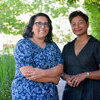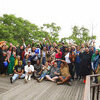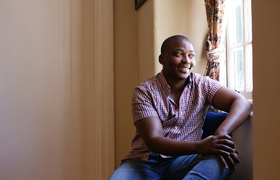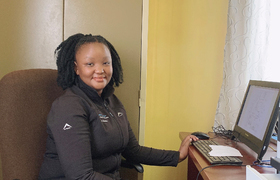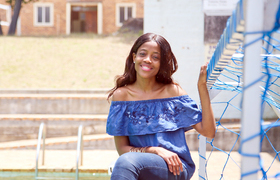‘UCT gave me freedom’
13 February 2020 | Story Niémah Davids. Photo Supplied. Read time 5 min.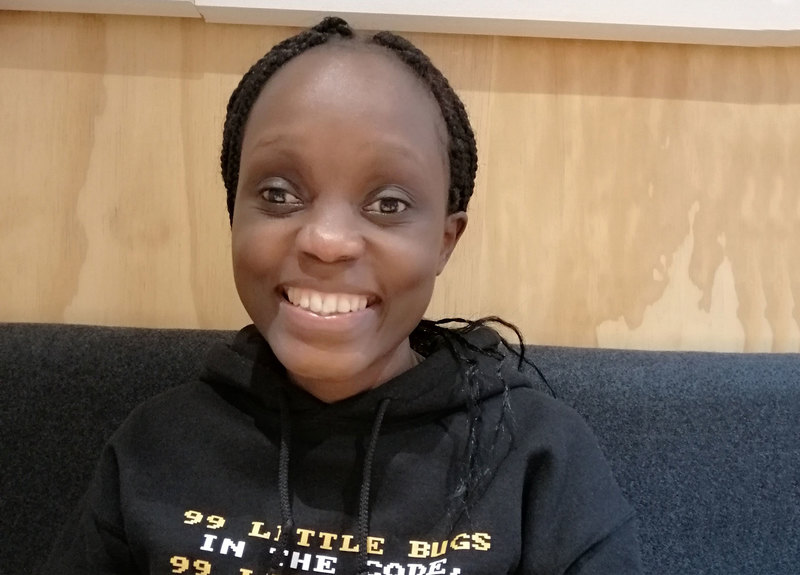
Joan Byamugisha’s decision to journey from her home in Uganda to pursue her PhD at the University of Cape Town (UCT) caught her family by surprise.
Today she understands why. When leukemia damaged her optic nerves and robbed her of her sight, her family became her primary support structure.
Adjusting to a new environment in a different country far from home is difficult for most students, and when the student is visually impaired, those fears are multiplied – especially for the family back home.
Joan would not allow her sight impairment to get in the way of achieving her PhD dream, and she set the wheels in motion to start her postgraduate studies in computer science at UCT.
After four years and many sleepless nights, her dream became a reality when she took to the stage in the Sarah Baartman Hall to receive her doctoral degree in December 2019.
“There’s a skewed perception that I defied the odds; that couldn’t be further from the truth.”
“Graduation day was an unbelievable experience. The one thought that kept going through my head was, ‘You did it!’ I also realised that support from the people around you really can make you achieve great things,” she said.
“There’s a skewed perception that I defied the odds; that couldn’t be further from the truth. My university helped me; my friends helped me. The world folded to accommodate me.”
She did admit to lacking a bit of enthusiasm about moving out of her comfort zone and away from her loved ones. She remembered being “terrified” at the idea of not having her family around to take her grocery shopping or to the ATM for a cash withdrawal. She even had nightmares about eating in front of people she didn’t know – would anyone tell her she had messed on her blouse or that she had mayonnaise on her cheek?
“Lifechanging” experience
Her fears vanished as soon as she arrived at UCT.
“I was taken aback at how helpful and supportive everyone was – my classmates, the university, everyone. I’ve never met anyone like my fellow students, and I am so grateful to them,” she said.
“My time at UCT gave me freedom to make mistakes and to ask for help. I realised that the latter was actually not that difficult.”
With a solid support structure, and thanks to her supervisors, Professor Maria Keet and Dr Brian DeRenzi, and UCT’s “incredible” Disability Service, Joan said she could focus her attention on her end goal and the reason she travelled almost 5 000 km to the Mother City – her research project and achieving good results at the end of her PhD journey.
And she did just that.
Teaching computers an indigenous language
Joan’s research project focused on natural language generation and identified a grammar engine to help recognise the grammar rules in her indigenous language, Runyankore, in order to output sentences for computer-generated prescriptions in the healthcare sector.
“I always found computers fascinating, and understanding their ability to interlink with different languages is very interesting,” Joan said.
“English is not the only language a computer needs, especially if it’s not the user’s first language.”
While her research is specific to Runyankore and a particular application, she said the underlining principles can be generalised to languages such as isiZulu and isiXhosa. What they have in common is that the grammar is based on the noun-class system, which determines the rules of verb conjugation and noun categorisation.
“English is not the only language a computer needs, especially if it’s not the user’s first language. My research seeks to prevent this barrier to entry.
“And teaching a computer a different language also means wider reach accessibility for the user. That’s the kind of inclusivity we need on the continent.”
Plans in the pipeline
Currently, Joan works as a research scientist at IBM Research in Johannesburg and while she enjoys every minute of it, she yearns to be part of the academic world.
“I love research and I love academia, and the two are a match made in heaven. I’d like to get into the academic world one day,” she added.
For now, Joan said she is elated that four years of hard work has finally paid off, and it’s onto the next challenge.
“I am motivated, blessed and I am happy. I look forward to witnessing what awaits me on this journey next.”
 This work is licensed under a Creative Commons Attribution-NoDerivatives 4.0 International License.
This work is licensed under a Creative Commons Attribution-NoDerivatives 4.0 International License.
Please view the republishing articles page for more information.





